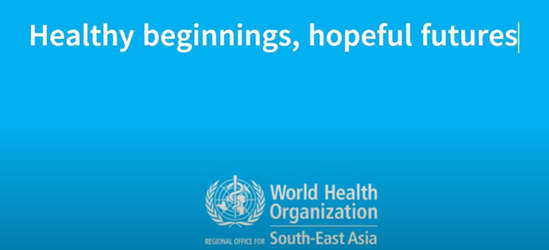
/countries/nepal/_j9a6884.tmb-768v.jpg?sfvrsn=4c72f30_1)
Nepal eliminates rubella
A cheerful nine-month-old, Prinsa Thapa, with her mother at Nagar Hospital, Birendranagar Municipality-7, Surkhet, waiting in queue to register for routine immunization following the 2023 Nepal earthquake
About WHO South-East Asia
One of the six WHO Regions, WHO South-East Asia is home to a quarter of the world’s population.
Committed to building a better, healthier future for the nearly two billion people in the Region, WHO is working with the 10 Member States to address persisting and emerging epidemiological and demographic challenges.
Officer-in-Charge
WHO South-East Asia Regional Director Saima Wazed is currently on leave.
During this period, Dr Catharina Boehme is serving as Officer-in-Charge.
Regional Director

Saima Wazed
Reassignment of Indonesia
Indonesia reassigned to WHO Western Pacific Region
On 23 May 2025, at the Seventy-eighth session of the World Health Assembly Member States approved the request from the Government of Indonesia for the country’s reassignment from the South-East Asia Region to the Western Pacific Region.
Evaluation Reports

Global Leprosy Programme
The Global Leprosy Programme (GLP) of the World Health Organization is housed in the WHO Regional Office for South-East Asia (and not in the Organization’s headquarters in Geneva). It is the Organization’s designated programme for addressing leprosy worldwide. Being classified as one of the 20 neglected tropical diseases (NTDs), the unit works in close collaboration with the Department of Control of NTDs in HQ, designated focal points in all regions, national leprosy programmes and partners.
World Health Day 2025

Featured activities
All →Featured publications
All →
Seventeenth Biregional Meeting of National Influenza Centres and Influenza Surveillance in WHO’s South-East...
To ensure better and holistic preparedness for the next pandemic, the 17th biregional meeting of NICs and influenza surveillance brought together key stakeholders...

Informing Public Health Decision-Making with Multisource Collaborative Surveillance: A Step-by-Step Approach
Managing health security threats require critical decision-making despite many uncertainties. One of the key lessons learned from the COVID-19 pandemic...

Thailand has made significant progress in cervical cancer control and is on track to achieve the 90-70-90 targets by 2030, particularly through HPV vaccination...

Second Regional Consultation(virtual) on SEAHEARTS Initiatives: Achievements and Lessons learnt
The Second Regional Consultation on the SEAHEARTS: Accelerating prevention and controlof CVDs in the South-East Asia Region (SEA/RC76/R5) initiative was...





/featured/saima-wazed--regional-director--who-south-east-asia-region--with-delegates-from-member-states-of-the-who-south-east-asia-region-in-geneva---may-2024.jpg?sfvrsn=59867737_2)



/featured/searo-x.png?sfvrsn=fa1d228c_4)